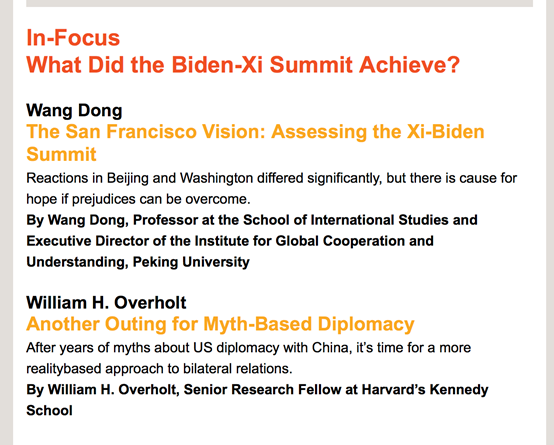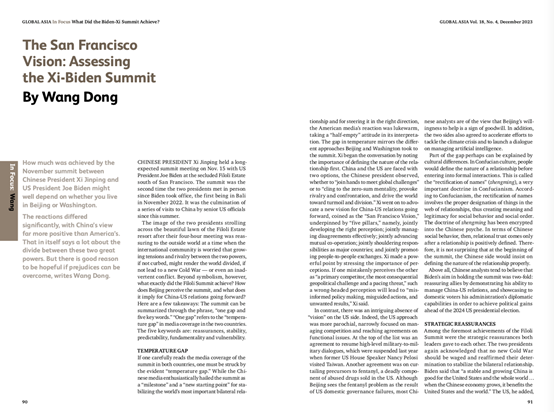Recently, Prof. Wang Dong, Professor at the School of International Studies and Executive Director of the Institute for Global Cooperation and Understanding at Peking University, published a feature article titled “The San Francisco Vision: Assessing the Xi-Biden Summit” in the latest issue of the internationally renowned policy journal Global Asia (Vol. 18, No. 4, December 2023). The issue focuses on the theme “What Did the Xi-Biden Summit Achieve?” and features two special articles, the other authored by William H. Overholt, a leading China expert and Senior Research Fellow at Harvard Kennedy School.
In his article, Prof. Wang summarizes the summit with the framework of “one gap and five key words.” The “gap” refers to the “temperature gap” observed in Chinese and American media coverage of the summit, while the five key words are reassurance, stability, predictability, fundamentality, and vulnerability.

The article first analyzes the reasons behind this “temperature gap.” Prof. Wang argues that President Xi Jinping emphasized the importance of defining the China-U.S. relationship and proposed the San Francisco Vision based on five pillars, pointing the way toward healthy and stable future development. By contrast, the U.S. side lacked both “vision” and “foresight,” focusing instead on managing competition and reaching agreements on functional issues. One of the main reasons for this difference, Wang explains, lies in the cultural and intellectual traditions of the two countries. Chinese Confucian thought emphasizes relational thinking, where relationships must first be properly defined (zhengming) to acquire legitimacy and trust. This explains why China insists on defining the nature of the bilateral relationship first. By contrast, American legalist thinking focuses more narrowly on concrete and utilitarian issues.

The first key word, reassurance, refers to the strategic reassurances both sides offered regarding their strategic intentions. While such reassurances cannot fully dispel doubts, they help reduce tensions, ease confrontation, and lower the risks of miscalculation in the increasingly fraught security dilemma.
On stability and predictability, Wang notes that although the summit did not resolve the structural contradictions between China and the U.S., it injected both qualities into the relationship. The resumption of high-level military dialogue, establishment of a counter-narcotics working group, launch of a COP28 and climate change working group, and the initiation of dialogue on artificial intelligence all signal clearly that the two largest economies are not pursuing decoupling but rather a “recoupling” based on mutual benefit. This positive signal will help stabilize international expectations for the trajectory of China-U.S. relations.
The fourth key word, fundamentality, was reflected in Xi Jinping’s remarks that the foundation of China-U.S. relations is built by the people, and their stories are written by the people. At a welcome banquet hosted by friendly groups in the U.S., Xi announced that China would invite 50,000 American youths to study and exchange in China over the next five years. Wang observes that surveys show American youth harbor less ideological prejudice and hold a more positive perception of China compared to older groups. This, he argues, is one of the most visionary initiatives of the San Francisco Vision, with the potential to revolutionize bilateral relations for decades to come. If realized, it could become one of the largest people-to-people exchange programs in history.
For the San Francisco Vision to be realized, Wang contends, the two countries need to forge a new engagement consensus based on mutual respect. Within this framework, China will no longer be viewed as an “other” to be transformed or assimilated into a U.S.-dominated order. Instead, people-to-people exchanges, especially among youth, will help narrow identity divides and reduce the risks of confrontation or conflict.
The fifth key word, vulnerability, underscores the fragility of the current bilateral relationship, particularly given the U.S. presidential election scheduled for November 2024. In today’s toxic political atmosphere, “China-bashing” has become political correctness in the U.S., making anti-China rhetoric a staple of electoral politics. If Biden loses and a hawkish Republican takes office, a new cycle of confrontation could emerge, even pushing the world toward a new Cold War.
The article concludes by recalling Dr. Henry Kissinger, highlighting prudence, pragmatism, courage, and foresight as the hallmarks of his diplomatic philosophy—qualities that remain essential as China-U.S. relations stand at a crossroads. Whether the San Francisco Vision and a new engagement consensus can be realized depends, in part, on transcending history to conceptualize our world philosophically, and envisioning one free from prejudice, fear, paranoia, and self-righteousness.
In the other feature article, Overholt argues that U.S. policy toward China has long been shaped by unrealistic “myths” about what diplomacy with China can or should achieve. Such myth-driven policies have persisted under both Trump and Biden. He contends that the Biden administration’s attempt to suppress China’s technological rise, while abandoning commitments on Taiwan, is not “de-risking” but “up-risking.” While American politicians may mislead voters by claiming tariffs protect jobs, American businesses face the reality of job losses. The San Francisco Summit, particularly Xi’s meeting with U.S. business leaders, brought some hope for the return of reality-based thinking in American politics.
Global Asia is an internationally recognized policy quarterly that provides an open and innovative forum for global scholars, policymakers, and business leaders to discuss the most pressing issues concerning peace, stability, prosperity, and sustainability in Asia.
Article link:
Wang Dong, “The San Francisco Vision: Assessing the Xi-Biden Summit,” Global Asia, Vol. 18, No. 4, December 2023. https://globalasia.org/v18no4/focus/the-san-francisco-vision-assessing-the-xi-biden-summit_wang-dong
Contributed by: School of International Studies